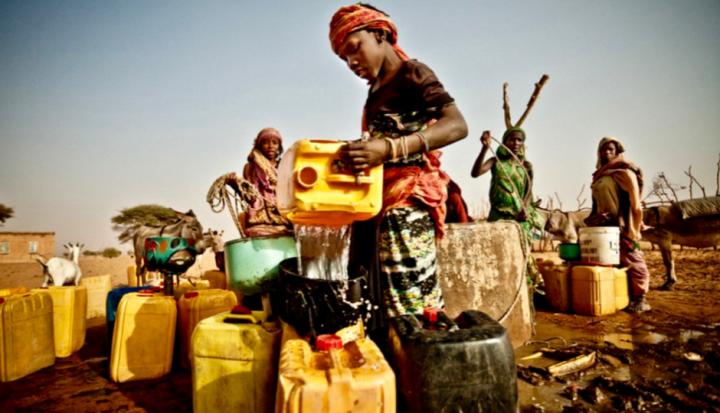New assessment provides path forward to manage increased risks of violence from climate change

Credit: Oxfam
MIAMI–Climate change–from rising temperatures and more severe heavy rain, to drought–is increasing risks for economies, human security, and conflict globally. Scientists at the University of Miami (UM) Rosenstiel School of Marine and Atmospheric Science are leading an effort to better assess the climate-conflict link to help societies manage the complex risks of increased violence from a changing climate.
The links between climate and the risk of violent conflict are well studied; however, scientists in varying research disciplines often disagree about the scope and severity of possible climate change impacts. Some of the open research questions are about the links between climate change and violence, including large-scale armed conflict.
In a new report in Earth’s Future, a group of scholars, with backgrounds including environmental and political science, geography, and economics, analyze the relationship between climate and organized armed conflict to define crosscutting priorities for future directions of research. In a previous assessment published in 2019 by the group, it was estimated that over the last century between 3-20 percent of organized armed conflict risk has been influenced by climate.
In this new assessment, the scholars suggest that future directions for climate-conflict research include deepening insight on what the links are, when they matter, and how they manifest. They suggest that future research can use data from diverse sources, including satellite and drone imagery, social media, and population surveys.
“Our changing climate poses threats for human security,” said Katharine Mach, an associate professor at the UM Rosenstiel School and lead author of the assessment. “In this commentary perspective, we provide a roadmap for future research that is supportive of appropriate societal responses. The options include deepening our understanding of how climate shapes security and conflict risks, as well as the ways in which research can prioritize ethical, interactive, and ongoing engagement with the many organizations and governments promoting peace and stability in societies.”
Changes in Earth’s climate are already impacting societies and economies and will further increase the risks of a range of outcomes, including civil conflict, which is profoundly and enduringly destructive for societies. Comprehensive and transdisciplinary efforts are needed to fully understand the multifaceted links between climate and conflict and appropriate responses by governments and humanitarian assistance organizations.
“This research topic is controversial and contested,” said Caroline Kraan, a PhD student in the Abess Graduate Program in Environmental Science and Policy. “We came together to provide a full range of expert views to establish a way forward for research that can serve decision-making needs.”
According to the authors, priorities for future directions of research include (1) deepening insight into climate-conflict linkages and conditions under which they manifest, (2) ambitiously integrating research designs, (3) systematically exploring future risks and response options, responsive to ongoing decision-making, and (4) evaluating the effectiveness of interventions to manage climate-conflict links.
###
The study, titled “Directions for Research on Climate and Conflict,” Earth’s Future – Volume 8, Issue 7, a journal of the American Geophysical Union, on July 2020.The study’s coauthors include: Katharine Mach from the UM Rosenstiel School, Caroline Kraan from the Leonard and Jayne Abess Center for Ecosystem Science and Policy at UM; Neil Adger from University of Exeter; Halvard Buhaug from the Peace Research Institute Oslo; Marshall Burke, James Fearon, Christopher Field, and Kenneth Schultz from Stanford University; Cullen Hendrix from University of Denver; Jean-François Maystadt from the University of Antwerp in Belgium; John O’Loughlin from University of Colorado Boulder; Philip Roessler from William & Mary; Jürgen Scheffran from University of Hamburg; and Nina von Uexkull from Uppsala University in Sweden.
About the University of Miami’s Rosenstiel School
The University of Miami is one of the largest private research institutions in the southeastern United States. The University’s mission is to provide quality education, attract and retain outstanding students, support the faculty and their research, and build an endowment for University initiatives. Founded in the 1940’s, the Rosenstiel School of Marine & Atmospheric Science has grown into one of the world’s premier marine and atmospheric research institutions. Offering dynamic interdisciplinary academics, the Rosenstiel School is dedicated to helping communities to better understand the planet, participating in the establishment of environmental policies, and aiding in the improvement of society and quality of life. For more information, visit: http://www.
Media Contact
Diana Udel
[email protected]
Original Source
https:/
Related Journal Article
http://dx.




